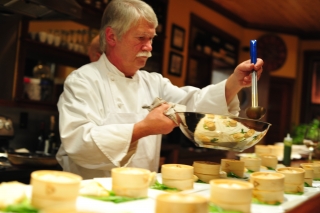
2021: A Time for an Industry’s Rebirth
29 December 2020From uncertainty comes opportunity for those willing to learn from the past and cut new trails toward a bright future.
By Paul Sorgule, MS, AAC
Well, 2020 is behind us and in its wake sits a restaurant industry that has been trampled by uncertainty and a culinary education industry that is left confused and less focused than it was just a few years ago. From uncertainty comes opportunity for those who are willing to learn from the past and cut new trails toward a bright future.
When any business is trampled on as much as foodservice and culinary education, there lies two options once the dust settles: we can accept defeat or we can rise up and embrace renewal. This might very well be the time to take a leap in new directions, to correct those challenges that were always put on the back burner and pay attention to what could be rather than what was.
Human tendency is to settle back into our old ways and hope for the best. This is the path of least resistance – a path we are familiar with – one that has worked at least at some level in the past.
COVID-19 has revealed a foodservice industry that has accepted its flaws for generations. It also unearthed an educational format that continues on a well-beaten path which no longer leads to success (yet it is the path we know) and a harsh reality that what we sell and how we sell it is no longer attractive in the marketplace.
Is 2021 the year we lay all the issues on the table and ask the question: “If we had to do it all over again, knowing what we know now, how would our businesses look and act?” We know that restaurants are not as profitable as they could be, employees are not as cared for as those in other industries, landlords are not as accommodating as our business model illustrate, and the supply chain has far too much control over how we operate. What could be done differently if the opportunity to change presented itself?
We know the cost of delivering a culinary education is much higher than most other degrees. Low student-to-faculty ratios, very expensive facilities, and mass supplies are required to deliver a skills-based education, which adds up to drive up tuition and lab fees. So high that college administrators question the viability of such programs. The sizzle of a culinary education which drove up enrollment for 30 years has lost much of its sparkle. What could be done differently if the opportunity to change was presented?
Is this the year when both the culinary classroom and the culinary industry seriously align to find answers to common challenges? Is this the year when your advisory boards become a catalyst for bringing both sides of a dynamic industry together to openly discuss these challenges and find solutions to problems that have plagued us for decades?
Human beings have short memories, especially when it comes to things that make us uncomfortable. There have been far too many instances throughout history where the need for good times quickly overshadows the lessons that could have been learned during tough times. Such could easily be the case in a post COVID-19 world. What will we learn? How will we act in the future? How will we turn this very challenging time and the impact it has had on an industry that we all love, into something positive and something that will bring us to a new prominence level?
This is not the time to dust off those old files, that curriculum that served us well for decades, those course syllabi that have always made sense before, and return to the products and outcomes that we established as essential simply to recharge the batteries and start-up where we left off. This is the time to right the wrong, to open our minds to fresh new ideas, to engage industry, students, alumni, and faculty in discussions about a new way of building learning organizations and properly prepared students for an industry that will be significantly different in the years to come. Necessity is the mother of invention – we have little choice in the matter – now is the time to act.
These next few years will determine how the industry of food and the support of education will rise to the occasion and collectively renew their importance and relevance. Let’s do this together.
PLAN BETTER – TRAIN HARDER
Paul Sorgule, MS, AAC, president of Harvest America Ventures, a mobile restaurant incubator based in Saranac Lake, N.Y., is the former vice president of New England Culinary Institute and a former dean at Paul Smith’s College. Contact him at This email address is being protected from spambots. You need JavaScript enabled to view it..
